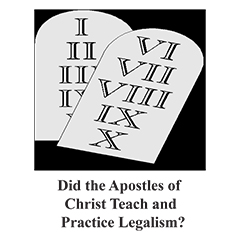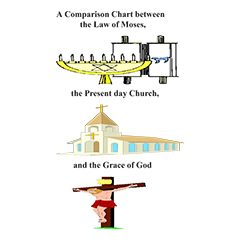Booklet Categories
Our Booklets
Would you like to send our FREE booklets to a prisoner that you may know.
Please send us a Request, we’ll add them to our monthly mailing list.
Visitors:
Fellowship Relationship with God, Temporal or Eternal?

Index
- What does Relationship mean?
- Relationship with God
- How can a Person know if he has a Relationship with God?
- What is the Fruit of a Relationship with God?
- Where does this Relationship with God lead a Person?
- Making Claim, Without Following His Aim
- Name it and Tame it
- What is not a Relationship with God?
- Relationship with God, how can I have it?
1. What does Relationship mean?
Webster’s Dictionary gives several meanings to the word relationship. The definitions are: “Connection, association, or involvement; an emotional connection between people.”
This description of relationship is most commonly seen between family members. Marriage, by its very design, brings forth a relationship which in effect make two people into one (Ephesians 5:31). This oneness cannot be duplicated in any other human bond. The marriage relationship between a man and a woman is reflective of Christ and the Church (Ephesians 5:25-29).
In a different way, it could be said that a father/son relationship is the closest relationship two people may have after the marriage relationship. The son is the father’s image in a new creation of God; this relationship is reflective of God the Father to His Son (Genesis 22:1-14; Mark 1:1; John 1:34; 8:54). One may ask, what about the mother’s relationship with a son or daughter? It is also true of the wife and mother.
However, when the family is in proper godly order, the woman as a wife, will be in oneness with her husband (Ephesians 5:22-24). As a mother she has an authoritative relationship with her children, for the husband and wife are one. Oneness with her offspring should always be second to the oneness with her husband (Genesis 3:16;Titus 2:4-5).
A mother who places a relationship with her children above the place of oneness with her husband creates a misalignment of God given family structure. The seeds of destruction are planted by such actions of the wife and mother.
The same consequences result from the husband who does not give his wife true reverence before their children. The husband who honors his wife before the children, will have children who honor their mother as they have learned from their father.
One may look at structural relationships between people as a series of circles. The circles start with a small circle at the center. Each circle going out from the center circle gets bigger and more distant from the center circle. Inside the center circle are the husband and his wife. God has designed that no other human relationship may invade this circle. The laws of the U. S. A. agree as no wife can be forced to testify against her husband in a court of law.
In the next concentric circle are the children. In relationship to the parents, this circle is the closest to the center circle. As the circles enlarge to form bigger circles, relatives and friends take their place in a more distant relationship to the husband and wife.
This God-given governmental order for the family is the highest order of relationship that man may experience on earth. This order, which is established by Scripture, can quickly be destroyed if either husband or wife breaks the circle.
There are innumerable relationships in this world; the marriage relationship between one man and one woman is at the center of all relationships for humans on this earth.
For a Christian marriage/relationship to be in order, Scriptural truth must be practiced. Only by honoring and loving his wife can the husband have a proper relationship with his wife. This is also true for the wife; unless she loves and obeys her husband in her marriage, a proper relationship is not possible. Also for the children; without obeying their parents, a godly relationship is not possible.
2. Relationship with God
Relationship with God is like a marriage. It is a spiritual union. Jesus is the Bridegroom; the Church is the bride. This marriage is forever (Revelation 21:9; 22:1-6). Relationship with God is the highest place a person may enter into in this life, or the next. This has been made possible by the work of Jesus Christ, through His atoning work on the cross and His resurrection from among the dead. Jesus, in His relationship with His Father, is the example for the Christian to see what a true relationship with God looks like. The oneness that Jesus had with His Father was total and complete. Jesus said, “For I do always those things that please Him” (John 8:29). To enter into a relationship with God only one thing is required; we must have faith to believe in Jesus Christ through the revelation of Him, shown to us in Scripture.
3. How can a Person know if he has a Relationship with God?
“Examine yourselves as to whether you are in the faith. Test yourselves. Do you not know yourselves, that Jesus Christ is in you? – unless indeed you are disqualified” (2 Corinthians 13:5).
In this verse, the Apostle Paul instructs those who profess faith to “examine and prove yourselves.” In verse 8 he teaches that following truth is “the pathway of faith.” The Apostle John instructs us in this way, “We are of God; he that knows God hears us; he who is not of God does not hear us. From this we know the spirit of truth and the spirit of error” (1 John 4:6 JND). Jesus said, “He who is of God hears God’s words” (John 8:47).
It is evident from these Scriptures and many others, that a person’s response (believing, adhering, receiving, walking after, incorporating into a person’s life) to the truth is the basis of all relationship with God. Truth, received into the heart and acted upon, is the place of relationship with God.
A person’s response to truth will be seen in the next chapter.
A person voicing or giving mental assent to known truths about Christ and the Scriptures, is not to be confused with the person who is spiritually reborn through receiving the Truth (Christ) into the heart. The Apostle Peter gives us more understanding: “Since you have purified your souls in obeying the truth through the Spirit…” (1 Peter 1:22).
Here Peter tells us this change takes place by “obeying the truth.” He further explains that this is through the Holy Spirit’s work in the person’s heart. The Greek word here for “obey” is Hupakoe, a composite of two words shown in Vine’s Greek/English dictionary. The word Hupo means “under;” the word Akouo, means “to hear.” Together, they mean to hear under, to come under the authority of.
The Adamic nature within the unconverted person does not want to be brought under the authority of Christ or the Word of God. Furthermore, that person is not able to be brought under the authority of the Spirit of God, because he does not have an ear to hear (1 Corinthians 2:14). Only by receiving the truth of Christ and His kingdom into his heart does a person develop an ear to hear.
Every professed Christian should examine his or her own heart to see if the Word of God is distasteful or offensive. The true child of God should find an inward desire to follow Jesus in the full and complete revelation of Scripture. The person who desires the truth of Christ to be put into practice in his or her own life, is the one who will be filled with the knowledge of God and His will (Proverbs 16:3; John 6:45; Colossians 1:9-10). An individuals personal spiritual knowledge of God is his relationship with God. This relationship is based on the truth revealed in Scripture, believed and received into the individuals mind and heart.
The term: “They did not know the Lord,” is found throughout Scripture (1 Samuel 3:7; Job 36:26; Jeremiah 9:3; 10:25; John 1:26; 8:25; 1 Thessalonians 4:5; 2 Thessalonians 1:8). This term is applied to every person who does not have the truth of God in their heart.
4. What is the Practical life of a Relationship with God?
“But the fruit of the spirit is love, joy, peace, long-suffering, kindness, goodness, faithfulness, gentleness, self-control” (Galatians 5:22-23).
It has been said that when two people are married for a long period of time in compatibility and fulfillment, each one reflects the character of the other. Some have said they even begin to look like each other. If this is true, it is exactly what we learn in Scripture that a relationship with God produces in a believer.
Marriage has a root to produce fruit. That root is: “they shall be one flesh,” the fruit are children (Genesis 2:24). Christ is the root of God’s kingdom. He has come forth out of the Root of Jesse (Isaiah 11:1); “And in that day there shall be a Root of Jesse, Who shall stand as a banner to the people” (Isaiah 11:10), the Anointed One of God (Isaiah 61:1). The fruit produced by Christ, the Root within the believer, is the fruit of the Spirit as shown in the beginning of this chapter (Galatians 5:22-23).
“For we are members of His body, of His flesh and of His bones” (Ephesians 5:30). The one who has the Spirit of Christ within him is occupying the position of being a member of His body, flesh and bones. What does this mean in the believer’s walk in this world? It is this: …”because as He is, so are we in this world” (1 John 4:17).
Jesus, as long as he was in the world, was the light of the world (John 12:35-36, 46). Jesus reflected everything that God is. He said to Phillip: …”he that has seen Me has seen the Father…” (John 14:9). So it is with the one who has a relationship with God. Jesus said of those who are His own: “You are the light of the world” (Matthew 5:14). This light in the one who has a relationship with Christ reflects the nature and truth of God. Christ will be made known to the believer who has a spiritual appetite to pursue truth in the Scriptures, by the Holy Spirit (1 Corinthians 2:10; 1 Peter 1:23; Ephesians 3:5).
Abraham’s faith was based on believing God, according to what God revealed to him (Genesis 12:1-3; 15:1-6; 22:1-18) not according to his own ideas. Many of the revelations of God were contrary to Abraham’s culture, nature, and desire. Abraham’s friendship with God was based on Abraham receiving, believing, and acting on truth. This was also true of the disciples of Jesus, when Jesus revealed truths to them which were contrary to their religious ideas, culture and their nature (Matthew 10:34-39; 16:21-25; 19:23-26; Luke 14:26-27). Truth of God revealed and received into the heart is the basis for every person who would have a relationship with God.
Jesus said, “You are My friends, if you do whatever I command you” (John 15:14). Jesus said this only to those who are His, because one who is not born of the Spirit of God cannot do the work of God, which is to believe Him (John 6:28-29). The difference between believing with the mind only, or believing with the heart is seen in the following verses.
Jesus spoke to the Jews who in John 8:30 are said to have believed on Him; a little later Jesus told them, …”My word has no place in you” (John 8:37). They believed with their minds only, not their hearts.
In John chapter six, Jesus proclaimed many truths previously unknown. Those who were said to be His disciples (verse 60), upon hearing these truths turned around and walked with Him no more (John 6:66). These Jews did not continue to follow Jesus when His words contrasted with their religion, carnal religious nature and their own desires. We may then say that the person who has a relationship with God is the one who receives into the heart the whole and complete counsel of God.
The evidence of a believer’s relationship with Christ is:
- Receiving the whole and complete counsel of God (Acts 20:27).
- Separating from the world, unto Christ. This may involve leaving family, friends, in some cases the “church” he attends, etc. (1 John 2:15).
- Love for the Lord’s brethren (John 15:34).
- Living in and walking after the Holy Spirit (Romans 8:9, 14; 2 Corinthians 3:2).
- The fruit of the Holy Spirit seen in his life (Romans 14:17; Galatians 5:22-23). These evidences are seen in a believer’s life by all men. These evidences are not achieved by striving after them. They are being incorporated into the believer’s life as he lives by faith in the word of Christ (Colossians 3:16; 1 Peter 1:23).
5. Where does a Relationship with God lead a Person?
“My sheep hear My voice, and I know them, and they follow Me. And I give unto them eternal life, and they shall never perish; neither shall any man pluck them out of My hand” (John 10:27-28).
A relationship with God assumes a divine authority and a divine presence on God’s side, and a response to it on man’s side. Through a person’s positive response to the revelation of Christ he becomes a follower of Christ. As he continues to listen in faith, the truths of Christ become to him what the Word of God was to the Psalmist, “Thy word is a lamp unto my feet, and a light unto my path” (Psalms 119:105).
A believer, responding in faith to the truths of Christ, will have his ears opened, even though in former days of his life he could not hear. Jesus said, “He that has an ear let him hear” (Matthew 13:43; Revelation 2:7, 11, 17, 29; 3:6, 13, 22).
The person who can hear is the person who is able to respond in faith to the truths of Christ. To that person Christ will become his “Light of life” (John 8:12), and all things will become “new” (2 Corinthians 5:17). Where the voice of Jesus is heard, this sentence from a hymn tells the story: “all other voices become strangely dim.”
Another aspect of the Holy Spirit living and working within the believer is the hope of Jesus coming for his saints to take them out of this world (1 Thessalonians 4:13-18; Titus 2:13). In 1 John 3:3, we are instructed that this hope produces pureness in the believer. “And everyone who has this hope in Him purifies himself, just as He is pure.” The Holy Spirit within the believer combines with the believer’s human spirit. As the Holy Spirit is given priority in the believer’s life through his faith to believe God’s words, the lordship and headship of Jesus is manifested in the believer’s life for all men to see. The Apostle John further tells us, “By this we know that we abide in Him, and He in us, because He has given us of His Spirit” (1 John 4:13).
Following after the truth of Christ gives liberty to the Spirit of God to transform a person’s life into conformity with the life of Jesus. This transformation is a normal Christian life, a spiritual life. This life brings a person into oneness with God through obeying the truth. It is not through following a pastor (no matter how gifted), church, culture, tradition or anything else that brings one to be able to hear and follow the voice of Jesus. Only a heart that desires the truth and responds to the truths revealed in Scripture, can do this.
Where voices of men, church creeds, traditions, culture, religious emotions, and love of the world are followed, Christian growth stops. Only in the voice of Jesus is the life of the Spirit found. Jesus made it clear when He said, “the words that I speak to you, are spirit, and they are life” (John 6:63).
6. Making Claim Without Following His Aim
“O Foolish Galatians! Who has bewitched you, that you should not obey the truth… Are you so foolish? Having begun in the Spirit, are you now being made perfect by the flesh?” (Galatians 3:1, 3)
It is said that there are 10,000 religious bodies in Christendom, who make up the many sects, denominations, independent gatherings and other doctrinal divisions, who claim to be following Scripture. However, in comparing the spiritual direction of these groups against Scripture, it is evident that a clear understanding of Scripture is greatly lacking. These groups in some cases say Scripture itself is lacking in truth. This is said because Scripture does not line up with the spiritual direction and doctrine of their group. For these sectarian groups, truth is thought to be what “we are doing and practicing.”
The Apostle Paul spoke of the necessity of believing the truth as set forth explicitly in the apostles’ doctrine. He said, “All men would be judged according to his gospel or doctrine” (Romans 2:16). Paul, and all the other apostles, taught the same gospel. The Apostle Paul taught that to change or pervert the revelation he received of Christ, would bring a person into an accursed place (Galatians 1:6.9). He further told us what he and the other apostles taught is the very Word of God (1 Thessalonians 2:13). A change by man or Satan from the doctrine of the apostles is perverting the gospel. The doctrine of Christ encompasses, Old Testament prophecies, the gospels, the epistles and the Revelation. Scripture states that the Church is built on Jesus Christ, the chief cornerstone, and the apostles and prophets are its foundation (Ephesians 2:20).
When individuals or religious groups claim relationship with God, yet do not follow or receive the truth as the apostles taught it, can it be so? Jesus said, “But why do you call Me, ‘Lord, Lord,’ and not do the things which I say?” (Luke 6:46) In the natural sense, when a man and a woman marry there is a relationship between them. But how can the relationship continue unless there is agreement?
God asked Israel, “Can two walk together, unless they be agreed?” (Amos 3:3) Again God attempted to persuade Israel, “Come let us reason together, says the Lord” (Isaiah 1:18). It is not possible or reasonable for a person to claim a relationship with God and yet reject His very words.
The word of God for those who would follow Jesus is found primarily in the epistles. The epistles give clear revelation and teaching as a pathway for the one who desires to have a relationship with God.
The Apostle John instructs in this way, “For this is the love of God, that we keep His commandments: and His commandments are not burdensome” (1 John 5:3).
To the one who desires Christ, His words are not rejected. Those who do reject His word, may reason as follows; rejection ; the word of God does not fit in with my life, my church, my independence, my ministry, my purpose, my goals for the future, or the world’s present day culture.
Seeking Christ, apart from all men or religious organizations, must be the aim of everyone who desires a relationship with God. Only in allowing the Holy Spirit to teach a believer through Scripture will the truth come into a person’s soul and spirit (John 16:13). The truth in Christ is God’s aim for all who claim relationship with God.
7. Name it and Tame it
“But sanctify the Lord God in your hearts…” (1 Peter 3:15).
If a person is to pursue a relationship with Christ, one must recognize the power of the Adamic nature within himself. That nature does not, can not and will not put itself to death. Yet if one is to have a relationship with Christ, the Adamic nature within him must be in the process of being put to death. This must be an ongoing process no matter how religious the Adamic nature is willing to be. Peter’s declaration of a believer sanctifying Christ in his heart does not include the Adamic nature within his person.
When Martin Luther was in danger of losing his life because of a papal bull (death warrant), someone asked him, “Are you afraid of the Pope?” He said, “the only Pope I am afraid of is right here in my own heart.” Every believer should have this fear of self because of the evil within, as Jesus told His disciples of the evil within them (Matthew 7:11).
“Knowing this, that our old man was crucified with Him, that the body of sin might be done away with, that we should no longer be slaves of sin” (Romans 6:6). Serving sin is not just physical, fleshly or carnal. It is spiritual sin that is the root of all sin. This we learn not only when Jesus addressed the example of the Pharisees’ lives, but from the instructions in Scripture as well. “Therefore having these promises, beloved, let us cleanse ourselves from all filthiness of the flesh and spirit, perfecting holiness in the fear of God” (2 Corinthians 7:1).
Many of the sins of the spirit in man are listed in Galatians 5:19-20, such as “idolatry, hatred, stifles, jealousies, angers, contentions, schools of opinions, envying, etc.” (JND). These sins come out of the heart.
Fleshly manifestations, the works of the flesh, come from what is in the heart or spirit within the person. Jesus said, “What comes out of a man, that defiles a man. For from within, out of the heart of men, proceed evil thoughts, adulteries, fornications, murders, thefts, covetousness, wickedness, deceit, lewdness, an evil eye, blasphemy, pride, foolishness. All these come from within and defile the man” (Mark 7:20-23).
For the person who desires a relationship with God, death to things not of faith is necessary. This is accomplished by faith in Jesus and what He teaches a believer to follow. The believer who continues in fleshly or spiritual sins, and yet tries to follow Christ, will have a war going on within his own heart. If the person does not surrender to the Spirit of God, but continues to be double minded (James 4:8), his life will at the very least be lived in defeat in the Christian life. The joy of Christ for that person will be a fleeting joy.
8. What is not a Relationship with God?
“Awake to righteousness, and do not sin; for some do not have the knowledge of God. I speak this to your shame” (1 Corinthians 15:34).
The Apostle Paul here is writing to the brethren at Corinth concerning the lack of knowledge of God among some of them (1 Corinthians 3:1). This lack of knowledge of God in the churches has intensified from that day to this day as prophesied (2 Thessalonians 2:3, 10-11; 2 Timothy 3:1-5). Because of the decline of Scriptural knowledge in the churches, a spiritual decline has set in as well. This decline in the knowledge of God has brought much deception, and devaluing of Scripture into the churches. Spiritual ladder climbing by men has had free rein, men teaching doctrines devoid of the truth, as well as a mixing with the world. All of this has created a general low spiritual state in the churches.
The low spiritual state that exists today in many churches has given false hope to those who do not know the Lord, yet are very religious. To the believer who desires to live in the riches of Christ, the professing church becomes a hindrance rather than a place of grace and truth. Man’s ways, doctrines, and practices are inserted into the place of Christ’s headship; He is the only rightful head over His people. Accordingly, in the democratic structure existing in the churches today, the lowest level of truth is often all that is taught.
A few examples are necessary to make clear the difference between relationship with a church and relationship with God. The spiritual understanding that many accept as relationship with God is seen in the following comparisons:
- Having a membership or place of fellowship in some church.
- For the Christian, fellowship is with the Son of God, not some church (1 Corinthians 1:9).
- Accepting the idea that the church teaches (rather than the Holy Spirit), and conformity to what it teaches means relationship with God.
- The true Church does not teach, but is taught (Acts 11:26; 20:20; Galatians 6:6).
- The culture of the world becoming the church’s culture and teaching, which translates into the doctrine that Scripture is culture and does not apply to a believer today. This brings “church” people to reject Scripture as unimportant.
- Faith in Christ puts Jesus, the living Word of God, alone as the place of truth to have relationship with God. “All Scripture is given by inspiration of God, and is profitable for doctrine, for reproof, for correction, for instruction in righteousness” (2 Timothy 3:16).
- Putting faith in water baptism to bring a person into relationship with God.
- Relationship with God is by grace alone. “For by grace you have been saved through faith; and that not of yourselves; it is the gift of God, not of works, lest anyone should boast” (Ephesians 2:8-9).
- Many are taught, and some assume that a spiritual or supernatural experience is a sign of a relationship with God. Modern day Pentecostalism, with its beginning in the year 1906 on Azusa street in Los Angeles, is the example of the physical determining the spiritual. For this movement, physical manifestations became the “standard of doctrine,” to determine if a person had a relationship with God. This became the standard in all Pentecostal Churches.
- Scripture instructs that those who have the Spirit of Christ have a relationship with God. “By this we know that we abide in Him, and He in us, because He has given us of His Spirit” (1 John 4:13).
- In many “churches,” the laity putting faith in the word of the clergy, a charismatic leader, or a particular church doctrine is thought to be the pathway to a relationship with God. The result of this direction is that the clergy, charismatic leader or church doctrine is believed rather than the Word of God.
- In contrast to leaders or church doctrines is Jesus the Word of God (John 1:1). Jesus said: “It is the Spirit who gives life; the flesh profits nothing. The words that I speak to you are spirit, and they are life” (John 6:63). It is evident that only faith in the words of Jesus bring life and relationship with God.
- Many are taught in the church by what they practice. For example, occupying a position, a place of authority, a ministry, being on the church payroll, being a part of the hierarchy, and such equate with a relationship with God.
- Scripture teaches something different: “Not by works of righteousness that we have done, but according to His mercy He saved us, by the washing of regeneration, and renewing of the Holy Ghost” (Titus 3:5).
- In marriage the innermost circle is only between husband and wife. Many people in churches are spiritually directed to think and believe that the innermost spiritual circle between God and man is through that church.
- The Word of God shows something different to be true. “Therefore having been justified by faith, we have peace with God through our Lord Jesus Christ, through whom also we have access by faith into this grace in which we stand, and rejoice in hope of the glory of God” (Romans 5:1-2). “Therefore if anyone is in Christ, he is a new creation” (2 Corinthians 5:17).
These are a sampling of doctrines widely accepted today and the answer of the Word of God to them.
9. Relationship with God, how can I have it?
This booklet has used the word relationship for the sake of those who use the word to relate to God. Scripture does not use the word relationship. It tells us that those who believe God to follow Jesus Christ are called into fellowship with Him. “God is faithful by whom you were called into the fellowship of His Son, Jesus Christ our Lord” (1 Corinthians 1:9). This fellowship brings the follower into friendship with God. Abraham is the example of this truth. Three times in Scripture Abraham is called “God’s friend” (2 Chronicles 20:7; Isaiah 41:8; James 2:23). This friendship with God is the purpose of God for every believer.
A person reading this may think to himself, is it really possible for me to be God’s friend? Jesus assured us it was His desire for His followers to be in unhindered friendship with Himself (John 15:14). Friendship with Jesus is based on faith which results in keeping His commandment (word). For how shall a person follow Him unless they make His word the priority in their heart above all things? Keeping only part of His Word is like a husband or wife keeping only part of their marriage vows, it simply does not and will not work. Neither does it work for the person who claims to follow Jesus if His Word is not heeded.
As Abraham kept all the Word of God, so a follower of Christ must keep all the words of Jesus to enter into a life of friendship with God. Scripture shows us clearly what it means to keep the word of Jesus. For example the gospel must be received into the heart of the person for that person to enter into fellowship with God (John 3:16; Romans 10:9.11; 1 Corinthians 15:1-4).
The day a person believes the gospel can be compared to a wedding day. The wedding day for a man and a woman is the beginning of a life-long growing expression of one flesh. This unity of oneness is God’s design for the man and the woman in marriage. A person who has believed the gospel has entered into a spiritual wedding. It is the day of new beginnings, a day where a spiritual union took place, a place of learning and growing into oneness with and in Christ.
The Church is the bride of Christ (Revelation 21:9). Each and every Christian is a part of the bride of Christ (1 Corinthians 12:20, 27). The believer, being in union with Christ, is in a learning, growing friendship. As an earthly wife is commanded of God to be in submission to her husband (Genesis 3:16; Ephesians 5:22, 24; Colossians 3:18), so is the believer to be in submission to Christ (James 4:7). The believer’s submission to Christ and what He instructs the believer through His Word, is paramount to coming into a growing friendship with Christ. To attempt to have a living vital fellowship with the Lord Jesus and not know or obey His instructions through His Word is not spiritual reality. Without the Word of God being the ground of truth through the Spirit, a believer can be deceived into a false following of his own heart and labeling it as God’s leading.
A friendship with Jesus is to hear Him with the ears of the heart and follow Him physically in the truth revealed in His Word, the Scriptures. For a believer who will hunger and thirst after the truth in Christ (righteousness), the promise of God is that he will be filled (Matthew 5:6). This filling is nothing more than the Holy Spirit revealing the Lord Jesus to that person. Jesus, who Himself is the Kingdom of God (for wherever He is so is the kingdom of God Luke 17:20-21 JND), will enter into fellowship and friendship with any who desire Him above all things – people, religion and human ways. This is the promise of God.
The word of Jesus has been given to any who have not yet believed Him, and to the religious church person who would desire a relationship, fellowship, and friendship with Himself.
This word is the invitation spoken to individuals in the church at Laodicea.
“Behold I stand at the door and knock. If anyone hears My voice and open the door, I will come in to him, and will dine with him, and he with Me” (Revelation 3:20).
This call of Jesus was to every person in the assembly at Laodicea. However, the invitation is for today as well, to every person in the “church” who wishes to follow the truths of His Word and thereby follow Him.
The riches of Christ Jesus is the inheritance for all who will respond to the voice of Jesus as revealed in Scripture. Jesus will be made a living Word by the Holy Spirit to that person (John 1:1). “For as many as are led by the Spirit of God, these are the sons of God” (Romans 8:14).
New King James Version
New Translation, Darby, John Nelson (JND)
Final
The inner circle between the husband and wife in marriage is the place that a Christian is designed to have with God, spiritually. This inner circle of fellowship that a believer is called to enter into is righteousness, peace and joy in the Holy Spirit (Romans 14:17). In this place there is fulfillment in the human spirit for the one who enters in (John 10:7, 9-10). Only through faith will a believer be able to live in this union with Christ, through the Holy Spirit. Jesus came into this world, suffered, bled, died, rose again and then sent the Holy Spirit to be the Comforter to those who follow Him. You may ask, why did Christ do all these things? The answer is, so that every believer may enter into oneness with the Father and the Son.
“If anyone loves Me, he will keep My word; and My Father will love him, and We will come to him, and make Our home with him” (John 14:23). This is the place God calls all men to, who hear and believe the gospel.
D. Neely
8-19-07


























































